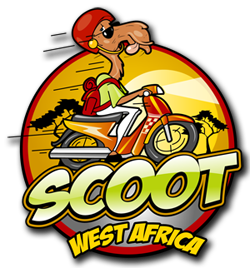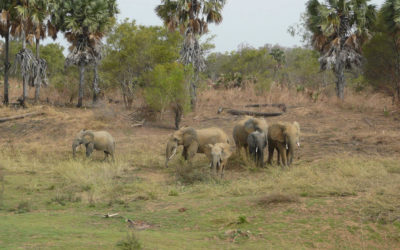In the context of West Africa and the ongoing unrest in the Sahel, which we are deeply familiar with and which has spread to neighboring countries, Ghana is a dream destination. The country is pretty much secure everywhere, and you can travel freely just taking the kind of precautions you’d take anywhere. As a female traveler, I traveled to all 10 of Ghana’s regions solo and had no issues.
Public transportation is easy to manage and you are sure to find friendly folks along the way. Ghana is a generally open and friendly, festive place – Ghanaians can party!
Even in the tiniest of villages you will find a roadside bar with plastic tables, designated by green or blue lights. It’s a contrast to places like Mali where people are more reserved and drinking outside of major hubs is mostly done behind closed doors (which may or may not be appealing to you depending on your personality). Even funerals in Ghana are often raucous affairs, and why shouldn’t they be?
Traditional Festivals
One of the highlights of visiting Ghana is the country’s rich festival tradition. In true Ghanaian fashion, no one is missing an opportunity to throw a party. But these festivals are deeply important culturally, though the significance varies depending on the context. Ghana, after all, has many cultures.
When referring to “festivals” in Ghana, you could be talking about a harvest festival to mark the end of a (hopefully) productive rainy season, a festival marking the beginning of another month on the traditional calendar, or the beginning of the fishing season. Each region has them, and each region has their own way of doing them.
A few to note: The Homowo festival, a harvest festival celebrated by the Ga people in the Accra Region; the Bakatue festival celebrated by the Fanti people in the Central Region every July marking the beginning of the fishing season; the Aboakyir festival in Winneba, not far from Accra, which includes a traditional antelope hunt; the Akwasidae festival celebrated on a Sunday every six weeks in the Ashanti Region marking the beginning of the Ashanti calendar.
Again, these are just a few: for a more comprehensive list of festivals organized by month, click here. The folks at Easy Track Ghana have done a good job of putting this list together. Note that some of the dates on the list are not necessarily on the same date every year and are subject to change by local traditional authorities.
No matter when you’re visiting or what regions you’re traveling to, you can catch a festival or two. So the festivals are all different, but alongside cultural activities you’ll probably find good food, good music, and good time. Here is a clip from the 2022 Homowo festival in Accra, which starts off with some ladies drinking beers on top of a taxi and includes general scenes from the festival:
Fire festivals
Homowo is one of the largest festivals in Ghana, but you’ll find a similar atmosphere at the smaller festivals too. If you find yourself in one of Ghana’s northern regions, attending a fire festival is a magical experience. The festival, called Buɣim Chuɣu and celebrated by Dagbon people in the northern part of the country, marks the beginning of a new lunar year.
If you’re in northern Ghana in the fall months, ask around and someone will be able to tell you when you can attend one. Many villages and localities have their own Buɣim Chuɣu; it’s not a centralized celebration.
Fire festivals are nighttime affairs where you may have to run to keep up with the crowd, and dodge a few wildly swinging torches along the way. Some may be more rowdy than others. I attended a fire festival outside of Bimbilla in Ghana’s Northern Region. After wondering around to a neighboring village where we heard a festival might be held, we were directed to another town.
Pretty soon we were surrounded by a lot of people who were running – we didn’t know to where – and carrying all sorts of homemade torches. On a village road that would normally be almost pitch black save for the occasional streetlight, the crowd was enveloped in an orange glow.

People were swinging fire at each other or dragging machetes across the ground (according to those in attendance, everyone was supernaturally protected from injury on the night of the fire festival, though larger festivals in the regional capital Tamale had been canceled that year because someone was killed by a stray bullet during celebrations). The sound of machetes on asphalt was a bit eerie but contributed to the charged atmosphere. It was such a one-of-a-kind event that I count it as one of my top three life experiences.
Contemporary festivals
Ghana is also on the map in the contemporary music and culture festival scene in a way that other West African countries are not. Chale Wote is a street art festival, which is in central Accra and has (rightfully) attracted a lot of attention in recent years. It’s a wonderful chance to dip your toes into Ghana’s booming art scene and see Ghanaian musicians and DJs live. Read about Chale Wote in Vogue here.
Afrochella is a music and culture festival featuring hiphop, pop, and electronic artists from across Africa and is held every year in December, attracting lots of international folks who are on winter holiday. Ghana is a popular destination for those visiting West Africa for the first time, and the Year of Return in 2019 was a state-sponsored effort to get more of the African diaspora, particularly Black Americans, to visit and relocate to Ghana.
A funeral story
Coming back to the festive funerals I mentioned earlier, a small funeral anecdote: one day as I was walking through the middle of Accra getting ready to head back to the University of Ghana, where I was studying at the time, a man and his young son sitting on plastic chairs on the side of the street told me to stick around. There was a funeral for a prominent personality in Bukom, a Ga fishing town in the heart of Accra. I was tired and wanted to get back to my dorm and lie down, but he insisted that it would be good show.
I relented and took a seat. A short time later, a procession of men paraded by with their pants pulled down past their butts and streamers placed between their ass cheeks.
A good show indeed.
Pretty soon the area was full of men dressed in drag and neighborhood folks who were mostly already drunk. Swept into the crowd, which had become massive by this point, I ended up in front of a small shop. The coffin was carried through the street right in front of the shop crowd-surfing style, and libations were poured liberally by onlookers. The coffin was styled as an evaporated milk container – read more about Ghana’s coffin tradition here.
There was no doubt about it, this was a party, and there was nothing somber about it. Coming from the U.S., I would have never guessed this was a funeral or that the life-sized tin of milk had a body inside. But now I can’t see wanting my funeral to be a black outfit affair.
Funerals aren’t a part of Ghana’s festival tradition, technically, but if you’re invited to a funeral (something that could realistically happen if you’re hanging out with a lot of Ghanaians!) you should be honored to take up the offer. And no matter what, Ghana’s festivals are not to be missed if you’re visiting the country.




0 Comments